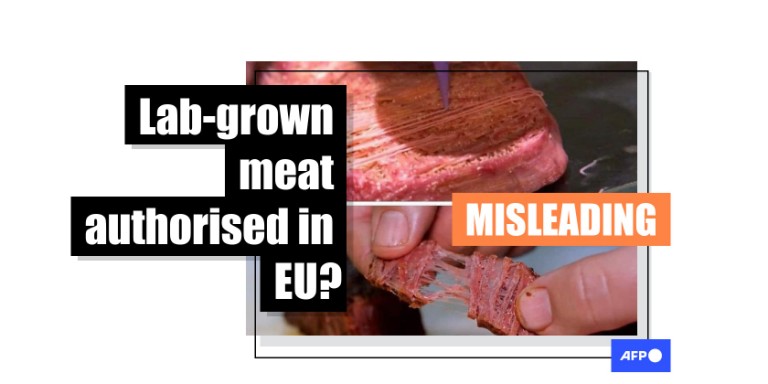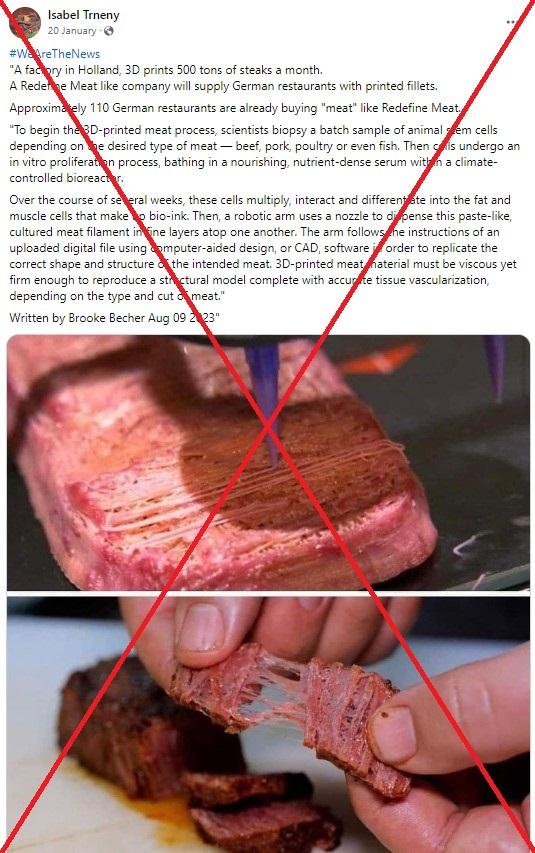
EU has not yet approved sale of 3D-printed cultivated meat
- This article is more than one year old.
- Published on February 23, 2024 at 03:05
- 3 min read
- By AFP Australia, AFP Austria
The misleading post claimed Redefine Meat, an Israeli company that makes vegan foods, had set up operations in the Netherlands, and was using animal stem cells to print its meat products.
"A factory in Holland, 3D prints 500 tons of steaks a month," an Australian Facebook user posted on January 20, 2024.
"About 110 German restaurants are already buying "meat" like Redefine Meat."
The misleading claim has spread on social media all over the world, with one Hungarian-language post receiving more than 4,600 shares since February 5, 2024.
Cultivated or laboratory meat is grown using animal cells that can be obtained without killing the animal (archived link).
3D printing can be also used to shape the product (archived link here).
However, as of February 23, 2024, cultivated meat cannot be sold in the European Union.
The misleading post's images show plant-based meat alternatives, but only one is a product created by Redefine Meat.
The top image was captured from a video report about a Spanish startup that 3D prints vegan meat by Deutsche Welle, with the exact footage seen at the clip's one-minute, nine-second mark (archived link).
The bottom image was captured from a Euronews video about Redefine Meat (archived link).

'False information'
Redefine Meat's website states that its products are entirely vegan (archived link).
"All Redefine Meat products are free from animal-based ingredients, thus suitable for vegans," the company said. "In fact, we believe that everyone should be able to enjoy new meat, and they are aimed at omnivores, flexitarians, vegetarians or vegans."
A spokesperson confirmed this to AFP on February 12, 2024, dismissing the claims on social media as "false information".
Redefine Meat is "a plant-based company that uses neither animal stem cells nor animal ingredients," the spokesperson said.
In January 2023, Redefine Meat founder Eshchar Ben-Shitrit told German magazine Wirtschaftswoche that 3D printers in one of his firm's factories in the Netherlands could produce up to 500 tons of meat substitute made from plant-based ingredients per month -- the same figure used in the false posts (archived link).
No authorisation for lab meat
In the EU, lab-grown meat falls under the Novel Food Regulation and has not been approved for sale in the bloc as of February 2024 (archived link).
"In principle, the cell and tissue cultures can come from animals, plants, microorganisms, fungi or algae," Annett Reinke of Brandenburg Consumer Advice Centre -- a German nongovernment organisation -- told AFP in an email on February 12, 2024.
"Cultivated meat and fish from the laboratory are therefore considered novel foods and must pass a series of critical tests and assessments before being authorised for the market."
When an application is submitted to the European Food Safety Authority (EFSA), the regulator checks if the novel product is safe (archived link).
A product may only go on the market after express EFSA authorisation and is then included on an EU list of novel foods (archived link).
Conditions of use, specific labelling requirements, or allergy information are also specified, according to Reinke.
"Only novel foods that are authorised and included in the list may be placed on the market in accordance with the conditions specified in the list," she said.
"There are currently no such authorisations for laboratory meat."
She noted that the sale of lab-grown meat was authorised in Singapore and Israel.
The European Food Safety Authority told AFP on February 13 that such products must be authorised under the provisions of the Novel Food Regulation before they can be sold on the EU market, saying: "Of the almost 300 novel food applications we have received for safety assessment since the implementation of the Regulation in 2018, we have not yet received any applications for the risk assessment of food of animal origin derived from cell cultures."
Some EU countries have made it clear they do not want cultivated meats in their markets.
In November 2023, the Italian government banned lab-grown meat (archived link).
Months later, Hungary's agriculture minister announced his government planned to follow suit (archived link).
Copyright © AFP 2017-2026. Any commercial use of this content requires a subscription. Click here to find out more.
Is there content that you would like AFP to fact-check? Get in touch.
Contact us
